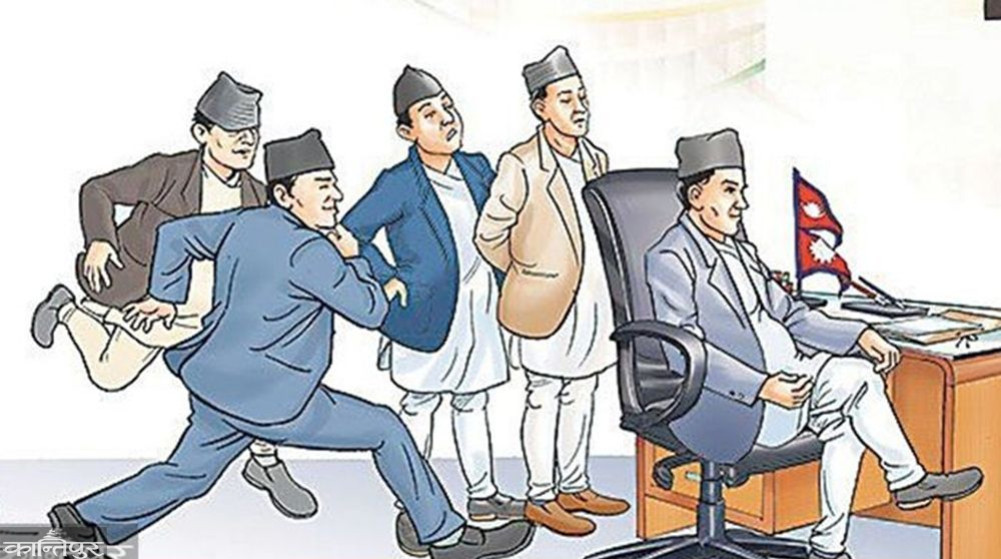Karnali until the employee actionposition?
We use Google Cloud Translation Services. Google requires we provide the following disclaimer relating to use of this service:
This service may contain translations powered by Google. Google disclaims all warranties related to the translations, expressed or implied, including any warranties of accuracy, reliability, and any implied warranties of merchantability, fitness for a particular purpose, and noninfringement.


In the heart of the Himalayas, Karnali is a region with complex geography and the existence of tolerant people. But the story of state neglect, discrimination and systemic injustice has also created another definition of Karnali. The clouds of neglect and indifference of the state hang in the sky of the high mountains and Nagbeli rivers here.



Therefore, most of the hopes and dreams of the local people are overshadowed . It is the responsibility of the state to protect and uplift its citizens. However, as residents of Karnali, we have not been able to experience that. We feel historically trapped in a cycle of constant neglect and abuse by the state .
We Karnali residents are destined to be silent witnesses of pain and injustice while bearing the burden of discrimination and marginalization for a long time.
The practice of sending those who are deemed unfit by those in power as a 'dumping ground' is one such blow that deeply hurts the heart of Karnali. We have repeatedly seen that such officials, be they judges, or civil servants, or (university) university staff were punished and transferred to our villages.
Why is our beloved Karnali made a place of exile for wrongdoers? What is the definition of remoteness of Karnali and who is responsible for that definition? And how long will the Karnali staff continue to be the point of action?
The system of the country has changed and has become a federal democratic republic. But the news titled "lack of staff in government office in Karnali" has not changed. How to change? Even till today, the thinking, style and behavior of 'I can fix it by transferring it to a remote place' is continued among the rulers.
Due to this, most of the assigned employees have been sent to remote areas to be punished or punished by the government. From the day of their appearance, the transfer initiative or the day of punishment is counted.
This kind of behavior of the decision-makers has not only affected the morale of the employees of these areas, it has also damaged the self-esteem of the innocent people of remote areas like Karnali.
On January 29, 2080, Chief Justice Vishwambhar Prasad Shrestha transferred Judge Yagya Prasad Acharya of Kathmandu District Court to Mugu District Court. The reason for the transfer was to order the bail of businessman Arun Chaudhary, who was accused of transferring the government (Bamboo leather shoe factory) land in the name of an individual. The order was transferred to the Acharya as it seemed unnatural.
Similarly, Judge Narishwar Bhandari was transferred from Rupandehi District Court to Morang and transferred to Dolpa District Court less than a month and a half ago. In August 2076, there was news that he was transferred as a result of a 'thief' comment on a Facebook post targeting the Chief Justice and the court.
The former Chief Justice of the High Court, Keshariraj Pandit, wrote on Facebook, 'Judiciary within a monarchy or a monarchy within a court or both? Khai kai kai kai!?' Bhandari and many others in the court sector commented on the post.
On May 2, 2066, Raju Rai wrote a blog on mysansar.com. In the blog printed under the title of 'Employee who steals money, suffering is remote', the case of Hemraj Pant, Judge of the District Court of Kathmandu, was transferred to Calicut. Judge Pant ordered Raju Gorkhali, who is on the police's most wanted list, to be released on a regular date after completing the process so that the police do not get involved. Pant, accused of being acquitted on the basis of money transaction without proper examination of fake documents, was transferred to Calicut as an undeclared sentence without any legal action .
I have no opinion on whether the judge's order is right or wrong in the above-mentioned incident . However, I object to sending him to Karnali as a punishment. If there is a mistake in the order or judgment of the judge, then he should be suspended and the process of investigation should be started immediately . Why transfer to Mugu, Dolpa, Calicot which is called remote? Why was there no departmental action? Isn't it insulting to the residents of that area to punish the transferee and assign them to another area of the country?
Are mugu, dolpa, kalikot the places where those who are in dispute are sent to take action or to clarify? In this way, the transfer of remote areas as a 'punishment' means that those who work there consider themselves to be 'punished'? What quality of performance can be expected from the employees who are posted there with this kind of inferior attitude? And why does a new transfer get to be another level employee there?
On the other hand, the judicial administration in a centralized structure has created a false impression that the punishment for the wrongdoing employee is transferable. Judges who are in charge of maintaining justice have been looking at Karnali as a place of detention.
How long will the people of Karnali continue to have this discriminatory trend, thinking and behavior of transferring weak employees to Karnali? Residents are not Nepali citizens? Is the geography of Karnali not within the borders of Nepal? The mentioned representative incident has not only become the basis of many such questions, it presents an example of how the state sees us Karnalibasi as second-class citizens.
It's time for everyone to think about how terrible this comment on inaccessibility has become. When they dare to raise their voice against the violence against them, they try to silence them with the threat of transfer to a remote area and the weapon of scalding.
A female employee in the School of Management of Midwestern University was threatened with remote transfer when she raised her voice against sexual violence by a senior employee in her office. It reminds us of the danger lurking in the shadows of our public institutions in the understanding of remote commentary .
In a similar context, I also remembered that I had read in some media a letter sent by the then state parliamentarian to the then federal minister of health and population, Upendra Yadav, saying that the employees working in various health institutions were against the party and transferred to remote areas. This is about November 2075. Addressing the Health Minister, Sahasram Yadav, Member of Parliament of Province No. 5 (Lumbini Province) from the Federal Samajwadi Forum, addressed to the Minister of Health Yadav, and sent a list of 25 employees working at various levels under the health service to be transferred to remote areas. The subject of the letter sent by the state MP to the federal health minister calling for the transfer of staff to remote areas due to non-cooperation of his party shows a stain on the conscience of our nation.
Such actions are creating a narrative that the residents of Karnali have no value and are not worthy of respect. This further marginalizes the Karnali and traps them in a vicious cycle of inequality and discrimination.
Moreover, the practice of using it as a dumping ground for controversial or underperforming employees has raised serious questions about the justice and administration of these sectors. This is reinforcing the perception that remote areas like Mugu, Humla, Dolpa, Calicot are not worthy of fair and effective governance and those sent there are being punished .
The use of remote areas as a means of punishment not only lacks due process and fairness, but also perpetuates existing inequalities . It undermines the judicial system, public trust in governance and the morale of the staff working in these areas.
The government and the judiciary should establish a transparent and accountable mechanism to address disciplinary issues and implement them effectively. Instead of resorting to punitive transfers, decisions would be made based on merit, fairness and adherence to the rule of law . Structural and systemic change is needed to promote inclusiveness, fairness and equal opportunities for all sectors within Nepal. It could not only maintain unity and harmony within the country but also protect the fundamental rights of all Nepalese citizens.
Justice, fairness and equal treatment according to law is the united demand of Karnalibasi . We do not accept being sidelined, how long will we suffer the punishment for the failure of those in power? How long to always show equality in speech and behavior? Why should our land be treated as a wasteland for those deemed unfit by those in authority? We may be remote and isolated, but we are not voiceless. May today recognize the time for the state to recognize our merits, recognize our contributions and give us the respect and dignity we deserve. Karnali is not a prison; This is our home, and as Nepalese citizens, we want to be treated fairly, justly, and with opportunity.
(Democracy Resource Center, run by Karnalibasi, is a researcher from Nepal.)
 प्रकाशित : फाल्गुन १७, २०८० १३:३६
प्रकाशित : फाल्गुन १७, २०८० १३:३६

 २४.१२°C काठमाडौं
२४.१२°C काठमाडौं
















